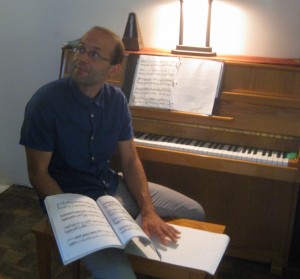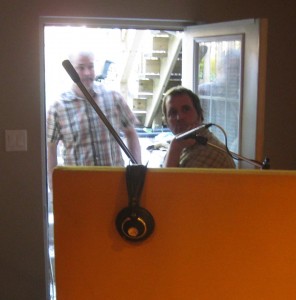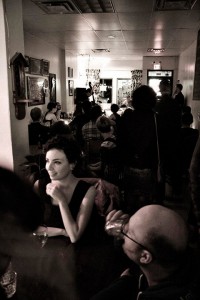I overheard two depressing conversations recently. One was on the streetcar, where a man was introducing his companion to another friend. The companion asked the friend, “what do you do?” and she replied, “I’m in development. I work for a company marketing solar panels.” The other conversation was in a coffee-shop, and one fellow was telling his companion about another friend: “She’s the CFO of the company.” Both of these exchanges struck me as quite alien to my social world–sentences like these really never come up when I talk with my friends about their careers–and thinking about that led to some sad reflections.
The woman selling solar panels seemed reasonably enthusiastic about her job, and I imagine the Chief Financial Officer feels fairly successful. To me, though, these job descriptions sounded much more unhappy than happy. One’s job is how one “makes a living”–it is not a small thing, but is, on the contrary, one of the largest components in shaping the form one’s adult life takes. Over the years and years of adult life, how many things will actually occupy more of one’s time than that job? Devoting that much of one’s life to matters of sales and financing seems to me a sad lot.
 The people around me make their livings in ways very different from this. I am surrounded mostly by teachers and musicians, with a few others thrown in: a visual artist, a musical instrument repairman, a couple of editors, a couple of recording engineers, a couple of owners of small clubs. These people have all devoted their lives to activities they find inherently fulfilling. It is true that these activities involve them in getting and spending money, (which is simply the common representation we have for the exchangeable worth of our efforts), but none of these people is in the business of “making money.” Some are in the business of making music; some are in the business of helping others to digest our vast cultural inheritance; some are in the business of running a neighbourhood institution–a coffee-shop or bar–that provides a site for social-gathering, and for perhaps for the display of the musical or educational activities of some of the others.
The people around me make their livings in ways very different from this. I am surrounded mostly by teachers and musicians, with a few others thrown in: a visual artist, a musical instrument repairman, a couple of editors, a couple of recording engineers, a couple of owners of small clubs. These people have all devoted their lives to activities they find inherently fulfilling. It is true that these activities involve them in getting and spending money, (which is simply the common representation we have for the exchangeable worth of our efforts), but none of these people is in the business of “making money.” Some are in the business of making music; some are in the business of helping others to digest our vast cultural inheritance; some are in the business of running a neighbourhood institution–a coffee-shop or bar–that provides a site for social-gathering, and for perhaps for the display of the musical or educational activities of some of the others.
 There is a fundamental difference between making a living by doing something you care about, and doing something for the sake of making money. What I found depressing in the conversations I heard was they way they reflected the fact that our society has developed in such a way that, for most people, making a living has to mean doing something for the sake of making money: for most people, making a living means working for someone else’s enterprise in exchange for a wage–and, likely, that other person’s enterprise is itself an enterprise designed for the sake of making money.
There is a fundamental difference between making a living by doing something you care about, and doing something for the sake of making money. What I found depressing in the conversations I heard was they way they reflected the fact that our society has developed in such a way that, for most people, making a living has to mean doing something for the sake of making money: for most people, making a living means working for someone else’s enterprise in exchange for a wage–and, likely, that other person’s enterprise is itself an enterprise designed for the sake of making money.
It’s possible, of course, that the solar panel company is a product of some person’s real interest in working to advance projects that improve our relationship to the natural environment, but it is also very possible that that company is a product of someone saying “I think that’s a product we could sell”; and, indeed, if it becomes a company that sells shares that are publicly traded on the stock-market, than, regardless of the original intention of the company’s founders, it will function exclusively as a money-making device.
The word “economics” is based on two Greek words: “nomos,” which means something like “law” or “custom” and “oikos,” which means the household, or the familiar place we make our home. Economics, then, basically means something like “the way we have established for making our home.”  The “money making” economics that defines our contemporary culture is very much at odds with what we might call the economics of “productive homemaking” that defines the life-practices of the circles of teachers, musicians and coffee-shop owners who are my neighbours.
The “money making” economics that defines our contemporary culture is very much at odds with what we might call the economics of “productive homemaking” that defines the life-practices of the circles of teachers, musicians and coffee-shop owners who are my neighbours.
It is a sad fact that I live quite a privileged and atypical existence–it’s not sad that I live that life, but that it is a lifestyle not open to many. In order to make a living, most people have to find a place for themselves in the money-making economy. That means that most people are destined to spend possibly the largest part of their lives devoted to a practice that is not inherently fulfilling and undertaken as something freely chosen for its own sake, but is undertaken out of necessity.
Of course I have no criticism of the woman’s enthusiasm for her job at the solar panel company: this is not a moral criticism of individuals who are content with–or stuck with–jobs of this sort. Indeed, many people may find great satisfaction in such work, for myriad reasons. My point, rather, is that it is sad that, by and large, these are all the options we have to choose from. Our culture has proudly advertised itself as a society of choice, and this is the notion that is typically rolled out to justify our economic system. It looks to me, though, like this is an economy in which most people have had realistic choices about ways of freely making a living eliminated, and they are instead forced to subordinate the bulk of their lives to the necessity of money-making.


 Participants in these
seminars consistently have the experience of growth in their conversation and
conceptual abilities, and typically leave with a transformed sense of the nature
and possibilities of philosophy.
Participants in these
seminars consistently have the experience of growth in their conversation and
conceptual abilities, and typically leave with a transformed sense of the nature
and possibilities of philosophy.





2 Comments
I found it interesting that you noted the sadness these conversations provoked. I share in that sadness, as I think we all do, when we realize how tenuous the relation between money and our lives actually is (as anyone knows who is looking for, or has lost a job, or is faced with unexpected expenses). I have often wondered about the sadness, about why the lives we are made to live (even in the enthusiasms we can express, as you point out), despite the fact, or rather, because of the fact that they engage our “choices,” can seem so desperately sad. The sadness it seems to me speaks to the powerlessness that accompanies this transformation of our lives into “livings,” these things that we “make” and that we represent to ourselves through the amount of money we have at our disposal. It speaks to the difference between being forced to “make a living” and the joy of “living (one’s) life.” Like you, I feel privileged to have been able to find in the world a job that I find meaningful, to be paid to do something I think is important, and not merely as a means to make money. But, as I consider this, I am unsure about your appeal to this older sense of “economics” as ways for making our home. To be sure, ultimately, all of these activities that occupy us do make for such a home, understood as a livable world. But we have also developed a sense of home that distinguishes itself from the world “out there,” a home we leave and return to, distinct from the world of work, negotiation, and exchange. Though that world can be hostile, it can also be a place of self-realization distinct from the comfort and security we find (hopefully!) at home. Indeed, home is in many ways a space of consumption, and in that sense, it can feed into the cycle of transforming “making a living” into merely “making money,” money that is then spent on the comforts and pleasures of home. This, after all, is how most of us relate to money, as a means to purchase those things we need and want. And yet, as you rightly point out, increasingly the possibilities open to us to “make a living” and thus to make money are tied the imperatives of “making money” as an end in itself. It is those reduced possibilities that are sad. Challenging those imperatives needs to be part of what it means to “make a living,” that is, to engage the world as a space of creative self-realization not reducible to money and the things money can buy.
Yes: The world needs to be a home for all of us–this is the sense in which I think of economics as “homemaking.” But it’s true, as you say, that our experience of that world will surely always be divided between the proximate and the distant, the familiar and the alien. That aspect of the world that is defined by distance and alienation is essential to us, and it does seem that money, as an indifferent means of exchange, has a proper place there. That said, money should not be mistaken to be the ultimate value in itself, but rather an appropriate structure of one essential dimension of our life–a dimension and structure that should be subordinated politically to responsible governance and that should be subordinated personally to more existentially rich aspects of living.